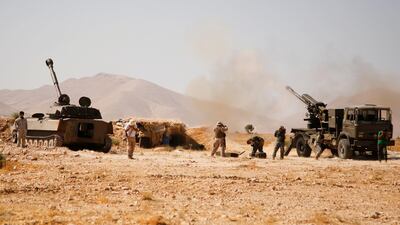The recent evacuation of ISIL militants from the Syrian-Lebanese border area to Al Bukamal in eastern Syria continues to make waves.
The deal, negotiated between the extremist group and Hizbollah, allowed ISIL to redeploy a few hundred combatants away from Lebanon towards the Iraqi border. This angered the Iraqi government, with Iraqi prime minister Haidar Al Abadi describing the accord as an "insult to the Iraqi people".
Brett McGurk, the US presidential envoy to the coalition against ISIL, was equally aghast. He summed up the bad feelings in a tweet. "Irreconcilable [ISIL] terrorists should be killed on the battlefield, not bused across #Syria to the Iraqi border without #Iraq's consent," he wrote.
To block the redeployment, coalition aircraft bombed the roads on which the convoy of buses was ferrying the ISIL combatants and their families to Al Bukamal, stranding them in the Syrian desert, where they remain to this day. Hizbollah has condemned the coalition's actions, making it appear that it is taking the side of ISIL. However, the reality is more complicated.
The evacuation agreement put an end to days of fighting along the Lebanese-Syrian border in the mountain areas east of Ras Baalbek and Al Qaa. It proved embarrassing to the Lebanese army, which was leading the offensive and had vowed not to negotiate with ISIL. However, Hizbollah and the Syrian army, who were attacking from the Syrian side, concluded the deal regardless, imposing it on the Lebanese government.
While Hizbollah's secretary general, Hassan Nasrallah, stated that the agreement was reached in exchange for information that ISIL provided on nine Lebanese soldiers abducted and killed by the group, no one really believed him. And here is where Mr McGurk's outrage seemed so out of place, as it ignored how much the regional actors involved in Syria find the battle against ISIL to be a sideshow in the pursuit of their own interests.
_______________________
Read more
US blames Syrian regime as ISIL convoy remains stranded for seventh day
Israel to hold drill simulating war with Hizbollah
Israel, Hizbollah will have to count to ten before their next war
Syrian troops breach 3-year ISIL siege on Deir Ezzor
_______________________
Hizbollah had two major goals in negotiating an ISIL withdrawal from the border area: it helped consolidate an Iranian-dominated de-escalation zone similar to the other ones being negotiated in different areas of Syria; and it created another precedent for side arrangements Hizbollah can negotiate in the future to return Syrian refugees to their homes.
Hizbollah's haste in July and August to settle the problem of ISIL and Jabhat Fateh Al Sham militants present along the Lebanese-Syrian border was a consequence of a US-Russian deal to create a de-escalation zone in southern Syria. That accord, negotiated behind Tehran's back, outside the Astana process in which it is involved, disturbed Iran. It sought to bar Iran and its proxies from a part of Syria bordering the Israeli-occupied Golan Heights, which could be used to attack Israel in the event of a new war.
In an effort to compensate, the Iranians accelerated efforts to push ISIL and Jabhat Fateh Al Sham, an Al Qaeda affiliate, out of a region that is strategically vital for them and for Hizbollah, which would be a major supply route to the party in any conflict with Israel. Hizbollah didn't much care about the reaction to the deal with ISIL, because it doesn't regard the group as a major problem. At most, Mr Nasrallah had to show some sympathy for the family members of the dead soldiers, which he did.
_______________________
Read more on Hizbollah in Opinion
A war with Hizbollah would essentially mean war with Iran this time around
Hizbollah’s regional agenda is a surefire recipe for more war
_______________________
But then, why did Hizbollah oppose the coalition's decision to block the ISIL convoy and, with the Syrian regime, seek to help the militants reach their destination? More importantly, why did Iran, whose foreign ministry spokesman described the coalition action as an effort to "impact negatively on the victory of the Lebanese government and resistance"?
Probably because Hizbollah wants to be seen as honouring its word with Syrian evacuees, many of whom live in party-controlled areas. Hizbollah has already returned refugees to Syria in separate agreements, without seeking guarantees for their safety and without co-ordinating with international relief organisations. To continue doing so – and to slowly remove this largely Sunni population from majority Shia areas – the party cannot be seen as sending those who agreed to depart to their deaths.
_______________________
More on ISIL and Al Qaeda in Opinion
'The State' drama series on ISIL is anything but apologetic
Is there ever an appropriate occasion to negotiate with terror groups?
The story of Hayat Tahrir Al Sham's rise to prominence and what it means for Syria
_______________________
Nor does Hizbollah risk much by allowing ISIL into eastern Syria. Along with the Syrian regime, it has followed the same tactic with Jabhat Fateh Al Sham, allowing its combatants to withdraw to Idlib governorate. Like Idlib, Al Bukamal and Deir Ezzor in eastern Syria are viewed by Hizbollah as zones where extremists can be concentrated and destroyed.
The priority of Iran and Hizbollah for now is to consolidate their control over the Lebanese-Syrian border area and gradually lower the number of Syrian refugees in Hizbollah-controlled areas. In that way, they will remove any threat to Hizbollah's weapons supply lines to the northern Beqaa Valley while removing a large population of potentially hostile Syrians.
Doubtless, Mr McGurk knows this. But he seems to feel, like many US officials, that the countries of the region are as obsessed by ISIL as the Americans are. To many of the region's countries and armed groups, however, ISIL is a useful tool that can be manipulated to advance their own objectives in Syria, while keeping the Americans busy as they do so.
Follow The National's Opinion section on Twitter


